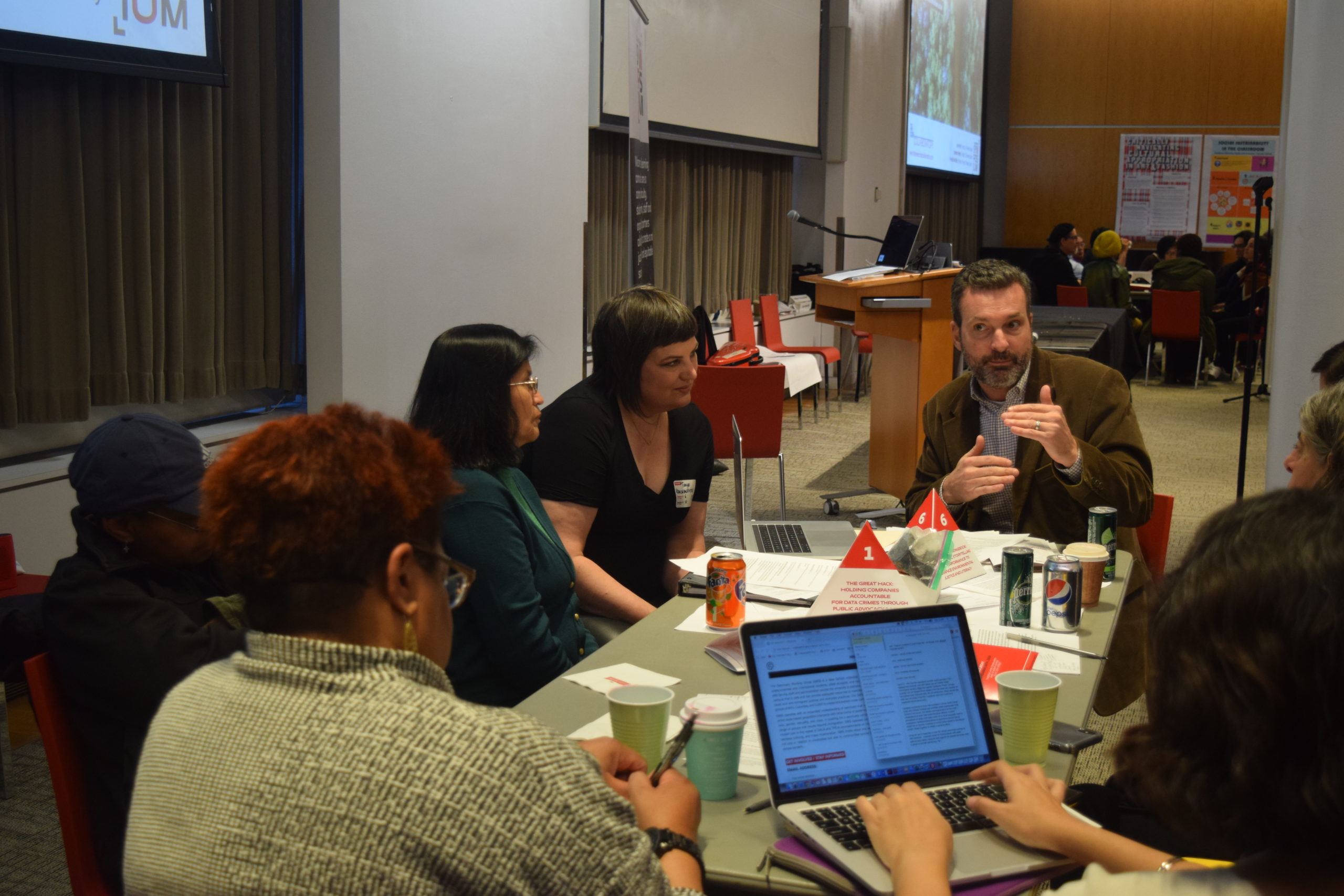Roundtable sessions “The Great Hack: Holding Companies Accountable for Data Crimes through Public Advocacy & Media” and “Tar Sands Songbook: Using Music, Storytelling, and Performance to Advance Environmental Justice and Literacy” merged to produce a rich debate around the unlikely but sound similarities between Big Data and environmental catastrophe.
The mining and dispossession of data and oil alike infringe on privacy and individual rights, creating hostile situations that benefit stakeholders alone. While ethical concerns surrounding Big Data and privacy are gaining increasing traction, it is far more challenging to draw attention and funding towards climate crises. The problem of complicity was also addressed; the onus of vigilance and ecological responsibility is placed on the individual, even though systemic players are at fault for creating the situations in question.
In a discussion about Netflix’s The Great Hack, Parsons professor David Carroll invited the table to reflect on the seductive power of data, raising an important question: is it possible to arrive at “objective truth” when we only have other data against which to measure the authenticity of data itself? In other words, data is not apolitical, neither does it arise out of a vacuum; instead, a constellation of vested interests and autocracy produces these standards of measurement.
“Using data as a way to prove something,” said Carroll, “lends to it a fictional impartiality.”
The Great Hack premiered on Netflix on the 24th of July, on the same day as the Federal Trade Commission issued a $5 billion fine against Facebook for its abuse of user data. The film was released worldwide all at once, with the exception of China, North Korea, Syria, and Crimea. Two artists were commissioned to work on the data visualization aspect of the project; unless data is rendered in a visible, tangible manner, a layperson would have trouble conceptualizing it.
Placing the onus on the individual to be aware of this, however, neglects the massive industry that has caused this and subverted democracy. Personal choices cannot be held accountable for systemic crises. This moved the discussion towards how climate change and data rights activists can share tactics to respond to similar problems.
Tanya Kalmanovitch and Cleo Reece addressed the issue of broadside extraction, which has caused 1.514 trillion litres of refuse to accumulate in what appear to be giant lakes of toxic waste. The process includes lifting all vegetation and soil from the earth, crushing it up, piping water from the Azabaskan River – all to separate oil from oil sand. Cleo Reece spoke of how her brother was hired to clean up an oil spill near the reserve she inhabits, but there is no way to get rid of it. Once it has seeped into the ground, it is there; you can see it, you can smell it, you can see where it goes.
“It’s very much a physical thing,” sighed Reece.
This creates a culture that is borne of oil. Individual lives in areas such as these identify with the industry; for many, oil has created a livelihood where they may have been no other option. When households are dependent on oil for their income, the people in affected areas remain trapped.
When asked how one can grapple with this sense of individual and corporate responsibility, Carroll and Kalmanovitch believed that creators of culture, media, and systemic powers need to be aware of how individuals are dispossessed of the rights they deserve. By framing this crisis as an individual problem rather than a collective one, corporations free themselves of responsibility, and exploitative conditions continue to negate the fundamental liberties of the people.
This article was written by Fareeha Shah. Fareeha is a writer and illustrator from Karachi, Pakistan. She is pursuing an MA in Creative Publishing and Critical Journalism at The New School. She is currently working on a collection of short essays and creative non-fiction.

